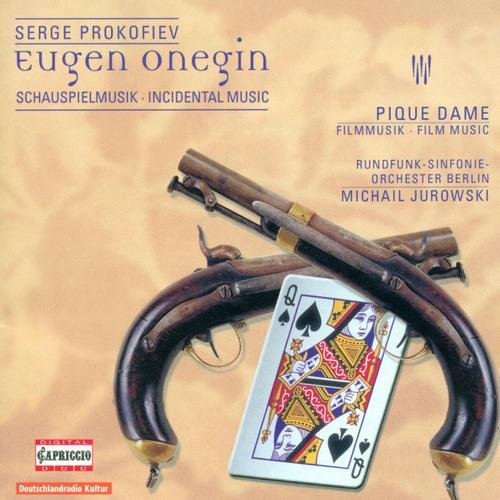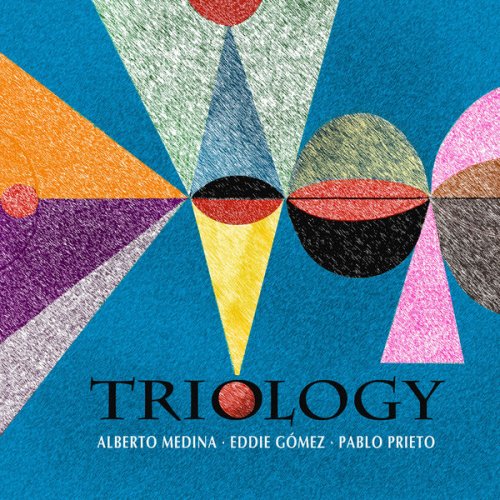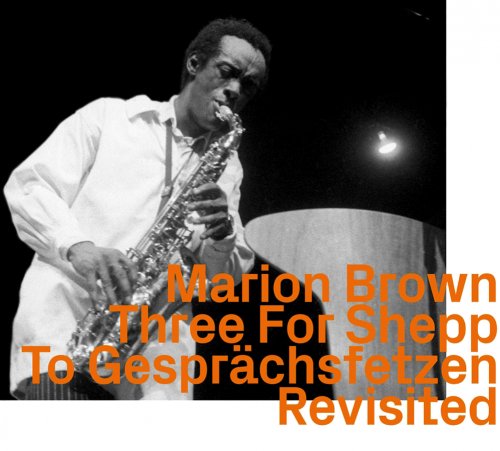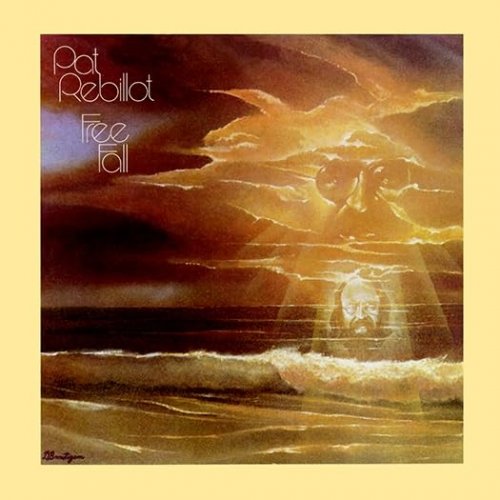Michail Jurowski, Berlin Radio Symphony Orchestra - Sergey Prokofiev - Incidental Music for Eugene Onegin & The Queen of Spades (2005)

Artist: Michail Jurowski, Berlin Radio Symphony Orchestra
Title: Sergey Prokofiev - Incidental Music for Eugene Onegin & The Queen of Spades
Year Of Release: 2005
Label: Capriccio
Genre: Classical
Quality: FLAC (tracks)
Total Time: 61:50
Total Size: 474 Mb
WebSite: Album Preview
Tracklist: Title: Sergey Prokofiev - Incidental Music for Eugene Onegin & The Queen of Spades
Year Of Release: 2005
Label: Capriccio
Genre: Classical
Quality: FLAC (tracks)
Total Time: 61:50
Total Size: 474 Mb
WebSite: Album Preview
CD 1:
Eugene Onegin, music for the performance of the Moscow Chamber Theater based on the novel by Alexander Pushkin, op. 71 (1936)
01. Scene 1: Lensky on the grave of Larina
02. Scene 2: Onegin and Lensky in the house of Larin in the village
03. Scene 3: At the Sisters' House - Scene 7: Tatyana's Letter
04. Scene 8: Onegin receives Tatyana's letter - Scene 10: Lensky and Onegin in Lensky's house
05. Scene 11: The Larins' Ball
06. Scene 12: Tatiana's Dream
07. Scene 13: The Duel
08. Scene 14: Tatiana's visit to Onegin's house
09. Scene 15: Intermezzo
10. Scene 15: Tatyana and Onegin meet in St. Petersburg
11. Scene 16: Onegin's letter to Tatiana
12. Scene 16: The Choir of Students
CD 2:
The Queen of Spades, suite from the music for M.Romme's film based on A.Pushkin's novel (1936, M.Jurovsky's Arr.)
01. Overture
02. Lisa
03. Morning
04. Hermann sees Lisa
05. Ball
06. Lisa in her room
07. Hermann in the gambling house (Second win)
08. Hermann lost
09. Last date
Performers:
Chulpan Khamatova, the narrator
Jacob Kuf, narrator
Boris Statsenko, baritone
Kevin McCutcheon, harpsichord
RIAS Chamber Chorus, Chorus master - Jorn-Hinnerk Andresen
Berlin Radio Symphony Orchestra
Michail Jurowsky, conductor
Rec. Berlin-Dahlem, Jesus-Christus-Kirche Mar 2003
Prokofiev's score for the Alexander Tairov production of Pushkin's play Eugen Onegin was never used (or orchestrated by the composer) because the play itself, thanks to Stalin's censors, was never staged. The resourceful Prokofiev reused the work's many gorgeous themes in a spate of famous works, including the operas War and Peace and Betrothal in a Monastery, the Eighth Piano Sonata, the ballet Cinderella, and Symphony No. 7.
Lasting here over 76 minutes and having 46 numbers, the work, orchestrated by Russian composer G. Zinger in accordance with notes left by Prokofiev, opens with a haunting lyrical melody that frequently reappears. Another striking theme, which appears in the first scene of War and Peace, is soon presented. In fact, there follows a parade of famous Prokofiev themes that many listeners will instantly recognize. Their context is often different: one of the famous waltzes from War and Peace, for example, shows up here in a deliciously dark and tart version for harpsichord!
As for the performance, the vocal soloists and chorus are splendid throughout: could the listener ever imagine greater spirit and color than what is heard in No. 26, the lively last number to the Ball scene? And the orchestra, under the direction of Prokofiev specialist Michail Jurowski, is convincing, too. The winds are especially attuned to the generally serene and darker character of the music: the oboist and bassoonist, in separate solos, float the lovely opening theme with a mesmerizing beauty. The added Russian narration does not enhance the work, but it isn't lengthy and not a major distraction. Downes (Chandos) and Ponkin (Harmonia Mundi) have recorded Onegin effectively, but this Jurowski version is clearly preferable: Downes is padded out with even more narration and dramatics and Ponkin is missing three numbers.
Pique Dame was written for a film project that was also canceled for political reasons. It, too, features themes Prokofiev later reused: the work's dominant melody is the main theme to the third movement of Prokofiev's Fifth Symphony. But the work is of less interest than Onegin. Why? The music is extremely repetitive throughout its 34-minute length -- some sections return unchanged again and again. Still, the music has its moments, from the dark and agitated opening to several mesmerizing appearances of the Fifth Symphony theme. Again, the performances are committed and the sound in both works here is detailed and powerful.
Lasting here over 76 minutes and having 46 numbers, the work, orchestrated by Russian composer G. Zinger in accordance with notes left by Prokofiev, opens with a haunting lyrical melody that frequently reappears. Another striking theme, which appears in the first scene of War and Peace, is soon presented. In fact, there follows a parade of famous Prokofiev themes that many listeners will instantly recognize. Their context is often different: one of the famous waltzes from War and Peace, for example, shows up here in a deliciously dark and tart version for harpsichord!
As for the performance, the vocal soloists and chorus are splendid throughout: could the listener ever imagine greater spirit and color than what is heard in No. 26, the lively last number to the Ball scene? And the orchestra, under the direction of Prokofiev specialist Michail Jurowski, is convincing, too. The winds are especially attuned to the generally serene and darker character of the music: the oboist and bassoonist, in separate solos, float the lovely opening theme with a mesmerizing beauty. The added Russian narration does not enhance the work, but it isn't lengthy and not a major distraction. Downes (Chandos) and Ponkin (Harmonia Mundi) have recorded Onegin effectively, but this Jurowski version is clearly preferable: Downes is padded out with even more narration and dramatics and Ponkin is missing three numbers.
Pique Dame was written for a film project that was also canceled for political reasons. It, too, features themes Prokofiev later reused: the work's dominant melody is the main theme to the third movement of Prokofiev's Fifth Symphony. But the work is of less interest than Onegin. Why? The music is extremely repetitive throughout its 34-minute length -- some sections return unchanged again and again. Still, the music has its moments, from the dark and agitated opening to several mesmerizing appearances of the Fifth Symphony theme. Again, the performances are committed and the sound in both works here is detailed and powerful.
DOWNLOAD FROM ISRA.CLOUD
Prokofiev Incidental Music for Eugene Onegin & The Queen of Spades 05 1512.rar - 476.0 MB
Prokofiev Incidental Music for Eugene Onegin & The Queen of Spades 05 1512.rar - 476.0 MB
![Ian Simmonds - All That's Left (2019) [Hi-Res] Ian Simmonds - All That's Left (2019) [Hi-Res]](https://www.dibpic.com/uploads/posts/2019-03/1554007281_folder.jpg)
![Tõnu Naissoo - Nordic Suite (2026) [Hi-Res] Tõnu Naissoo - Nordic Suite (2026) [Hi-Res]](https://img.israbox.com/img/2026-01/27/9so2z3ab1rjo0qkgwhwre1np0.jpg)






